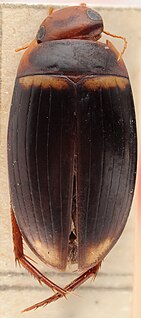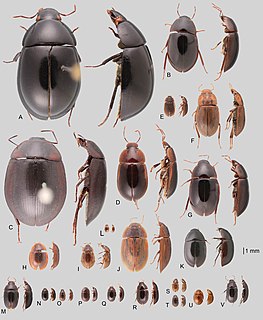
The whirligig beetles are water beetles, comprising the family Gyrinidae that usually swim on the surface of the water if undisturbed, though they swim underwater when threatened. They get their common name from their habit of swimming rapidly in circles when alarmed, and are also notable for their divided eyes which are believed to enable them to see both above and below water. The family includes some 700 extant species worldwide, in 15 genera, plus a few fossil species. Most species are very similar in general appearance, though they vary in size from perhaps 3 mm to 18 mm in length. They tend to be flattened and rounded in cross section, in plain view as seen from above, and in longitudinal section. In fact their shape is a good first approximation to an ellipsoid, with legs and other appendages fitting closely into a streamlined surface. Whirligig beetles belong to the beetle suborder Adephaga, which also includes ground beetles and diving beetles.

The Dytiscidae – based on the Greek dytikos (δυτικός), "able to dive" – are the predaceous diving beetles, a family of water beetles. They occur in virtually any freshwater habitat around the world, but a few species live among leaf litter. The adults of most are between 1 and 2.5 cm (0.4–1.0 in) long, though much variation is seen between species. The European Dytiscus latissimus and Brazilian Megadytes ducalis are the largest, reaching up to 4.5 cm (1.8 in) and 4.75 cm (1.9 in) respectively. In contrast, the smallest is likely the Australian Limbodessus atypicali of subterranean waters, which only is about 0.9 mm (0.035 in) long. Most are dark brown, blackish, or dark olive in color with golden highlights in some subfamilies. The larvae are commonly known as water tigers due to their voracious appetite. They have short, but sharp mandibles and immediately upon biting, they deliver digestive enzymes into prey to suck their liquefied remains. The family includes more than 4,000 described species in numerous genera.

Copelatus is a large genus of small diving beetles. There are some 470 described species in the genus, found worldwide, but they are most diverse in tropical South America, Africa and South-East Asia.
Maurice Auguste Régimbart was a French entomologist who specialised in Coleoptera, particularly Dytiscidae, Gyrinidae and Hydrophilidae. Regimbart worked on expedition material collected mainly from French, Italian and Belgian colonies. He was a member of the Société entomologique de France.

Gyrinus is a genus of small aquatic whirligig beetles in the family Gyrinidae native to the Palearctic, the Near East, the Nearctic, North Africa, Asia and Australia.

Dineutus is a genus of beetles in the family Gyrinidae, the whirligig beetles. They are 9 to 15 millimeters long. Their elytra are smooth, shallowly lined, or grooved.
Porrorhynchus is a genus of beetles in the family Gyrinidae, containing the following species:

Andogyrus is a genus of beetles in the family Gyrinidae, containing the following species:
Macrogyrus is a genus of beetles in the family Gyrinidae, containing the following species:

Aulonogyrus is a genus of beetles in the family Gyrinidae, containing the following species:
Metagyrinus is a genus of beetles in the family Gyrinidae, containing the following species:
Gyretes is a genus of beetles in the family Gyrinidae, containing the following species:.
Orectogyrus is a genus of beetles in the family Gyrinidae, containing the following species:

Suphisellus is a genus of beetles in the family Noteridae, containing the following species:
Copelatus quadrisignatus is a species of diving beetle. It is part of the genus Copelatus in the subfamily Copelatinae of the family Dytiscidae. It was described by Régimbart in 1877.
Copelatus ragazzii is a species of diving beetle. It is part of the genus Copelatus in the subfamily Copelatinae of the family Dytiscidae. It was described by Régimbart in 1877.
Copelatus restrictus is a species of diving beetle. It is part of the genus Copelatus in the subfamily Copelatinae of the family Dytiscidae. It was described by Sharp in 1882.

Acidocerinae is a subfamily in the family Hydrophilidae of aquatic beetles, and it contains over 500 species in 23 genera.

Gyrininae is a subfamily of ground and water beetles in the family Gyrinidae. There are at least 60 described species in Gyrininae.
Laccophilus ellipticus, is a species of predaceous diving beetle widespread in India, Myanmar, Sri Lanka, China, Cambodia, Indonesia, Thailand, and Vietnam.









